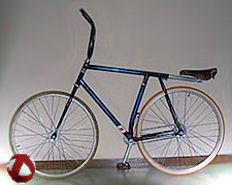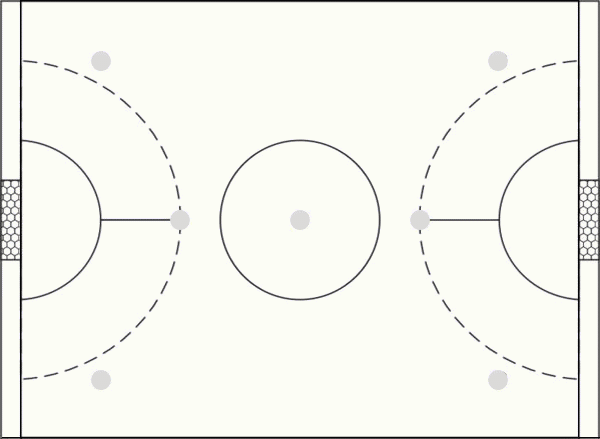What's Cycle-ball
Cycle-ball is a ball game like football. Two teams compete for points by
scoring goals. A big difference is that each player is riding a bicycle
to play the match. They strike the ball with the front or rear wheel or
their body.
Bicycle and Ball
The bicycle is designed special shape so that player can do a good handling
of bicycle to shoot the ball into the goal while controlling the ball.
It's using fixed gear system, no brake system.
The ball has a textile surface and it has a weight of about 600 grams, about 18 cm in diameter, and is filled with kapok etc.
----- The following is about 2 riders' cycle-ball -----
Duration and Playing field
Although the rule is the same as football roughly, a standard cycle-ball
match consists of two periods of 7 minutes each and there is a 2 minute
half-time break between halves. The cycle-ball court is 14 by 11 meters,
and surrounded by a slanted boarding of about 30 cm height. The goal is
square and measures 2 x 2 m.
The winning team begins the first half by striking a ball placed on the centre point with front or rear wheel, after the whistle for starting the game. (The other team shall start the second half.)
How to play the game or ride a bicycle
The feet and the hands must not be used unless they must be on the handlebars
or the bicycle pedals. Headers are permitted. If a player touches the floor
or leans on the ball or the goal post, that player is not permitted to
continue playing. To continue his play, he must go back to his own end
line and cross it once.
A player inside his own penalty area is allowed to use his hands off handlebars as goal keeper. However, two players in same team are not allowed to be in a penalty area at a time.
Other rules are almost the same as Association Football.
There are the following 3 events
- 2 riders’ cycle-ball
The match is played by two teams consisting of two players a team. The match field size is 11m x 14 m, surrounded by slanted boarding.
- 5 riders’ cycle-ball
The match is played on a handball field by two teams consisting of seven players: one goal-keeper, four field players and two substitutes.
- Field cycle-ball (6 riders' cycle-ball)
The match is played on a half football field by two teams of six players each.
Bicycle and Ball
The bicycle is designed special shape so that player can do a good handling
of bicycle to shoot the ball into the goal while controlling the ball.
It's using fixed gear system, no brake system.The ball has a textile surface and it has a weight of about 600 grams, about 18 cm in diameter, and is filled with kapok etc.
----- The following is about 2 riders' cycle-ball -----
Duration and Playing field
Although the rule is the same as football roughly, a standard cycle-ball
match consists of two periods of 7 minutes each and there is a 2 minute
half-time break between halves. The cycle-ball court is 14 by 11 meters,
and surrounded by a slanted boarding of about 30 cm height. The goal is
square and measures 2 x 2 m.How to start the match
Before starting a game the referee shall toss a coin to determine which team shall start the game.The winning team begins the first half by striking a ball placed on the centre point with front or rear wheel, after the whistle for starting the game. (The other team shall start the second half.)
How to play the game or ride a bicycle
The feet and the hands must not be used unless they must be on the handlebars
or the bicycle pedals. Headers are permitted. If a player touches the floor
or leans on the ball or the goal post, that player is not permitted to
continue playing. To continue his play, he must go back to his own end
line and cross it once. A player inside his own penalty area is allowed to use his hands off handlebars as goal keeper. However, two players in same team are not allowed to be in a penalty area at a time.
Other rules are almost the same as Association Football.
Illegal act or play
It's not necessary to take rules too seriously. Following behaviors are looked on as against the rules and will be penalized; purposely pushing or grasping opponent, shouting loudly, and dangerous play to the other players.-
Free Kick
A free kick is granted for offences committed outside the penalty area.The team that committed the offence must keep a distance of at least 4 meters from the ball until the ball has been served by the opponent after the whistle from the commissaire.
-
Penalty Kick
A penalty kick is the punishment for serious offences committed and will be given to the opposite team. The ball on the penalty mark has to be struck directly without bluffing towards the goal.
-- if the offence is done inside player's own penalty area.
-- If a player stops his opponent by a serious fault, e.g. tackles or pulls the opponent from the bicycle.
-- Playing the ball purposely by hand outside the penalty area.
-- If a player who is not allowed to participate in the game (with or without bicycle) stops an opponent by walking, running, jumping for more than 2 metres and prevent him from a goal kick.
-
Corner Ball ( Corner Kick )
If a ball is hit by a defending player, or comes off the defenders body or bicycle and crosses his own goal line, the commissaire shall whistle to stop the game and a corner will be awarded to the opponent.
Further details about the rules
Japan Federation
of
Indoor Cycling
181-5, Jurakumawari-nisimachi,
Nakagyo-ku, Kyoto
604-840, JAPAN
info_jfic@yahoo.com
